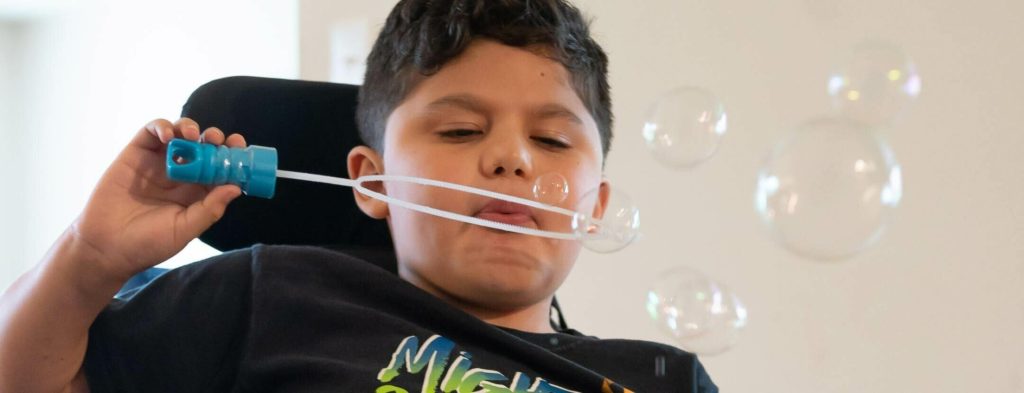Sam rolls up to the playground and takes in the whole scene. Groups of kids are busy exploring the equipment like monkeys traversing a rainforest canopy. The midday blare of cicadas is interrupted only by the giddy screaming of his peers as they crawl, climb, and jump from an array of playground structures.
Silas, his younger brother, begins running toward the jungle gym. Sam races him, using the joystick attached to the armrest of his wheelchair to deftly maneuver down the paved path and overtake him. Sam slows down as he approaches the play area, his large tires crunching over the cedar mulch. He sets his sights on a yellow slide.
Ramon senses his son’s desire and walks up to him. “Slide,” Sam pronounces in his high-pitched voice, exuberant. His father bends over and lifts him sideways out of his chair and carries him up the stairs to the platform above, to the entrance of the chute. He places Sam at the precipice and lets him take things from there. Esperanza, Sam’s mother, waits at the bottom of the slide.
“Sam is so persistent. If you tell him he can’t do something, he’ll show you that he can. That’s what makes me so proud of him.” – Esperanza, Sam’s mother
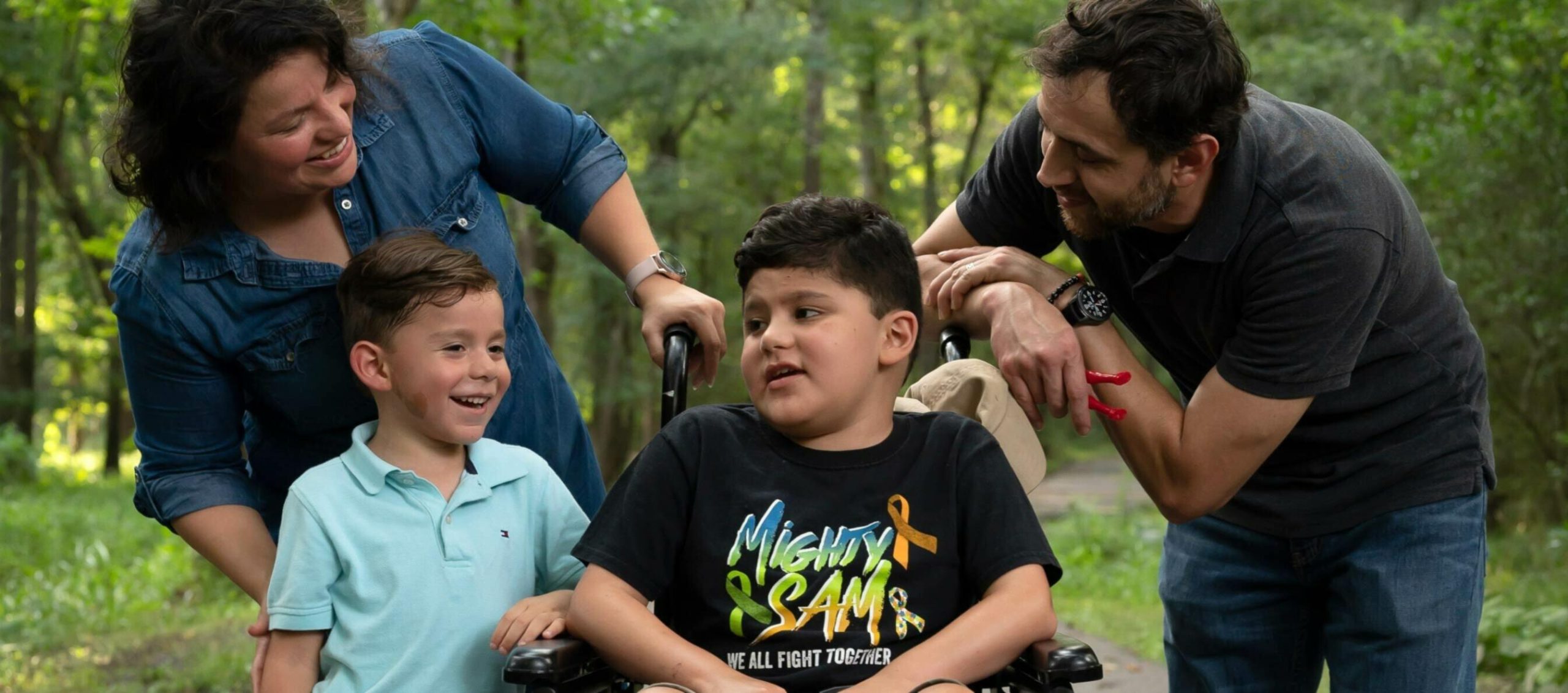

Everyone’s attention is on Sam as he musters his strength to push off. Silas cheers him on, while Esperanza, reaches for her phone, eager to capture the moment on video. With great effort, Sam swings his body forward again and again until gravity takes over and, in a moment of weightlessness, he descends to the bottom of the slide. Sam lights up. The joy brought on by these moments is contagious and something that the whole family seeks throughout their days. “Sometimes all we need is something funny, a little blessing, to make our day,” says Ramon.
Sam, or Mighty Sam, to those who adore him, including on social media @themighty_sam_journey, is in the midst of battling Duchenne muscular dystrophy (DMD) and cancer simultaneously. He has earned his nickname by enduring a reality that is difficult to imagine—he is one of the only known cases of both conditions. “Sam is so persistent,” says Esperanza. “If you tell him he can’t do something, he’ll show you that he can. That’s what makes me so proud of him.” Despite the severity of his diagnoses, Sam and his family have learned how to move forward, coming to terms with his condition, and supporting him in his needs. “If I can be as tough as him,” says Ramon, shaking his head, “I can go through anything. He never complains.”
Sam was born in the West Texas town of Odessa, where Ramon was raised, an eight-hour drive from Esperanza’s hometown of Houston. Long interstate drives are part of the reality of living in a notoriously big state and as chance would have it, both Ramon and Esperanza were driving west to the border city of Juarez, Mexico on the same day in 2004. They both made pit stops in the tiny crossroads of Van Horn. There, the two 20-year-olds struck up conversation and exchanged fake names but legitimate emails.
“He would say ‘momma’ and things like that when he was one,” remembers Esperanza. “But once he turned two, he just wouldn’t say anything. He was completely mute. That’s when we started getting scared.”
What started as a long-distance friendship morphed and soon, a romance blossomed. Ramon drove the eight hours to Houston to see Esperanza, and she returned the favor, eventually moving to Odessa while Ramon finished school. The two married in 2005 and after a few years started to plan a family.
Sam’s arrival, in many ways, prompted the departure from Odessa and return to Houston. There, Ramon found work in a hospital radiology department, where he still works today, and Esperanza continued to work and raise her son, glad to be close again to family. Sam began learning words and communicating with his parents, although it was clear that he struggled with language. “He would say ‘momma’ and things like that when he was one,” remembers Esperanza. “But once he turned two, he just wouldn’t say anything. He was completely mute. That’s when we started getting scared.”
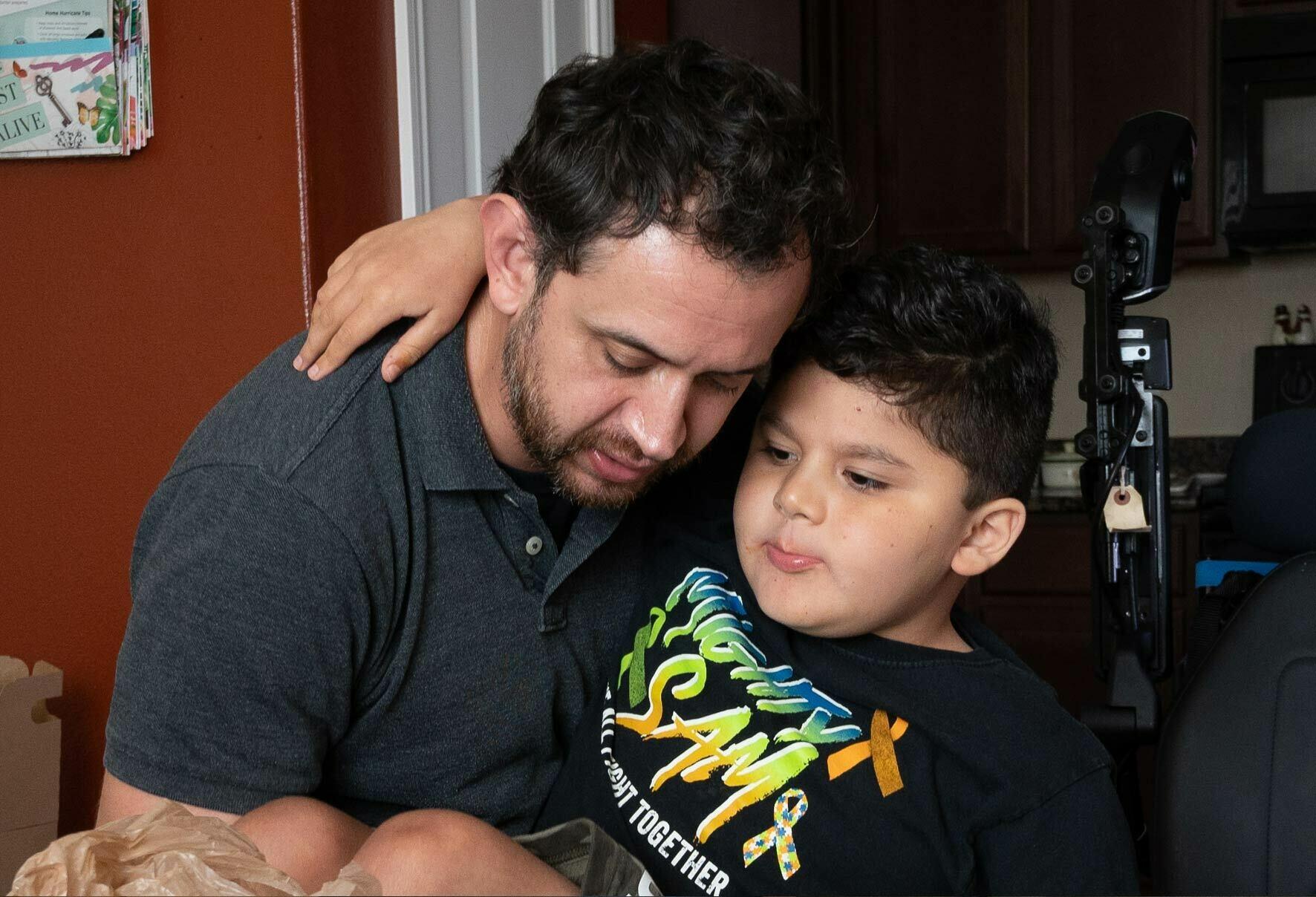

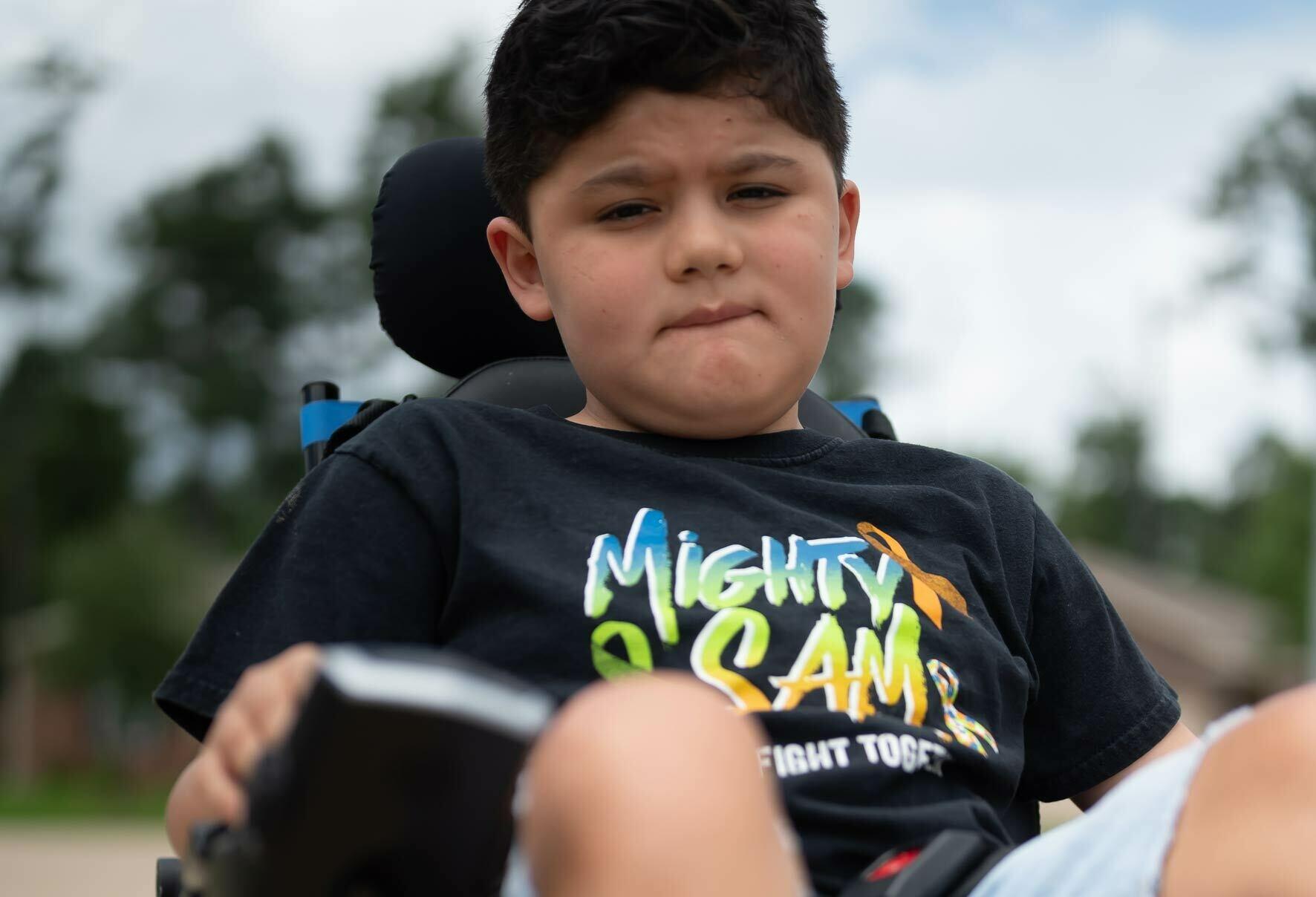
Other tendencies made their way into Sam’s daily life. He couldn’t leave the house without opening and closing each and every cabinet door. He arranged his toys neatly, but never played with them. A speech pathologist tested for deafness, but soon surmised that Sam was on the autism spectrum.
The news was not easy, but Esperanza utilized her knowledge and experience to support Sam. “When I was in Odessa, I was going to school for early childhood development,” she relays. “So, I had an idea of what to expect, but it just hits you differently when it’s your child.” Expectations for a normal life for Sam were already shifting—and bigger changes lay on the horizon.
Making sense of autism, understanding the broadness of the spectrum of the disorder, proved crucial in uncovering the coming maladies that Sam would face. “It’s not that I was looking for something to be wrong with Sam,” says Esperanza. “I didn’t want to compare him to other children, and I didn’t know what to expect.” Sam was clumsy and fell frequently. His gait was different, and he began walking on his tippy-toes. His calf muscles were overtly pronounced. These signs alerted their pediatrician and then, a neurologist, who, in November 2016, ordered blood work.
“Other DMD parents are so amazing. They have so much knowledge—more than the doctors sometimes.”
The urgency spelled trouble. Esperanza received a late-night voicemail, and a few days later, she sat in the neurologist’s office, learning about muscular dystrophy. “We had never heard of it,” she recalls. The neurologist ordered more tests, which went on to indicate that Sam, now five, had been born with Duchenne. “We asked our doctor if there was a treatment or cure?” says Ramon. They learned that while current therapies have led to better outcomes for young men with DMD, the illness was terminal.
Devastated but determined to pick themselves up, Ramon and Esperanza sprung into action. They got Sam started with physical therapy, and made inroads into the DMD parent community, replete with useful tools and information. Social media proved key for Esperanza, allowing her to connect with other families dealing with the disease. “We became this village,” she reflects. “Other DMD parents are so amazing. They have so much knowledge—more than the doctors sometimes.” Sam started taking steroids to combat some of the muscle weakness that had begun affecting him.
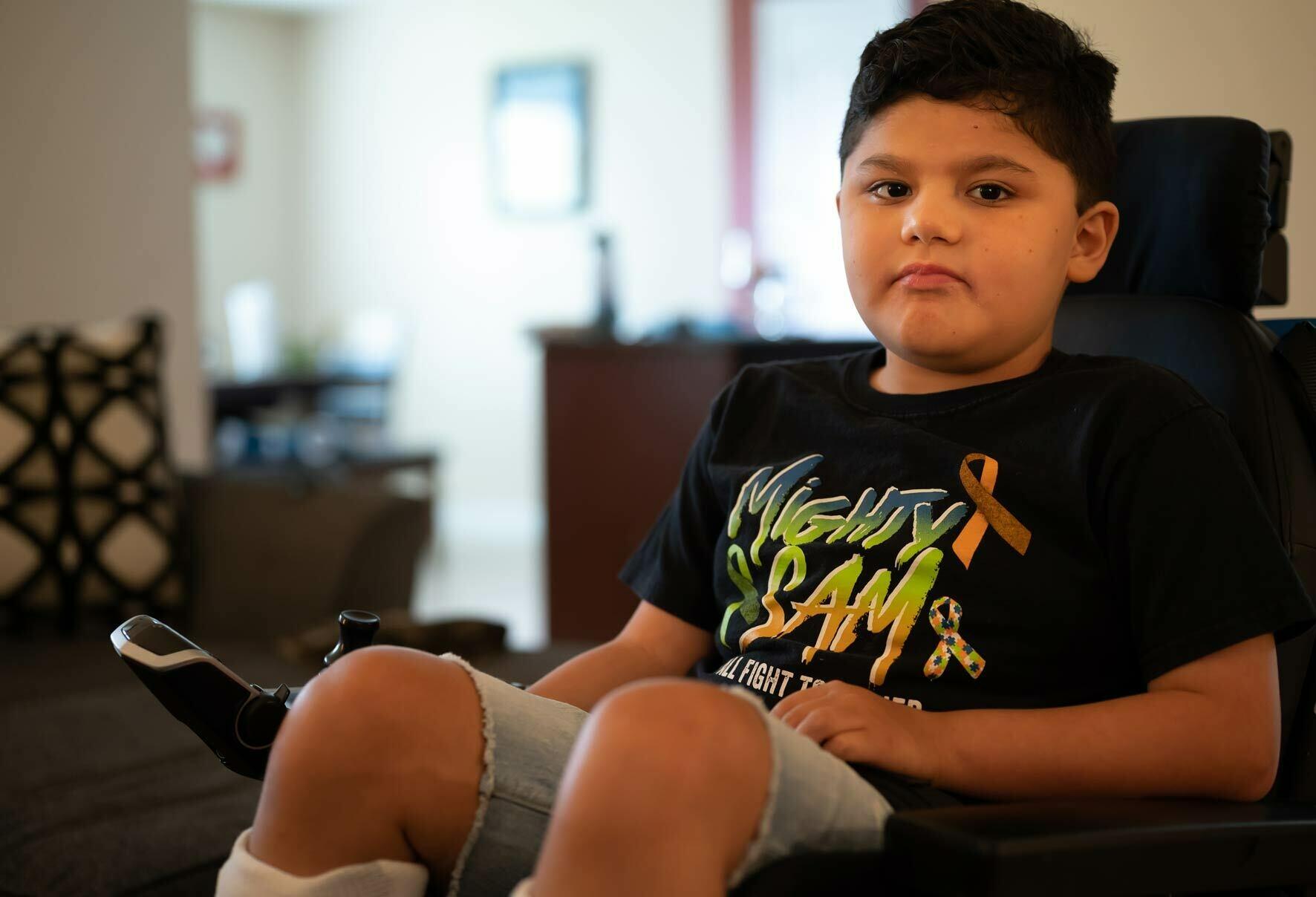
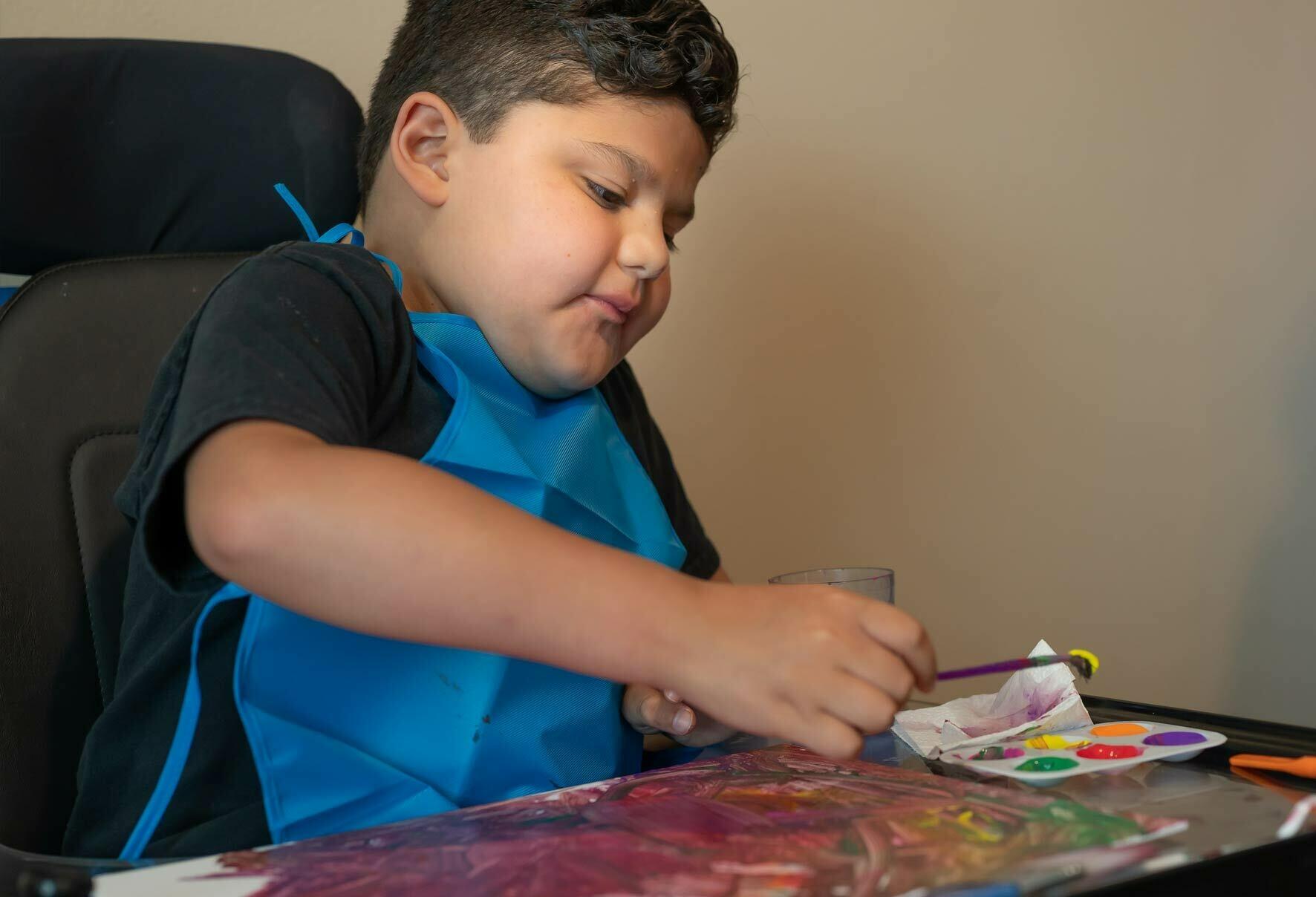
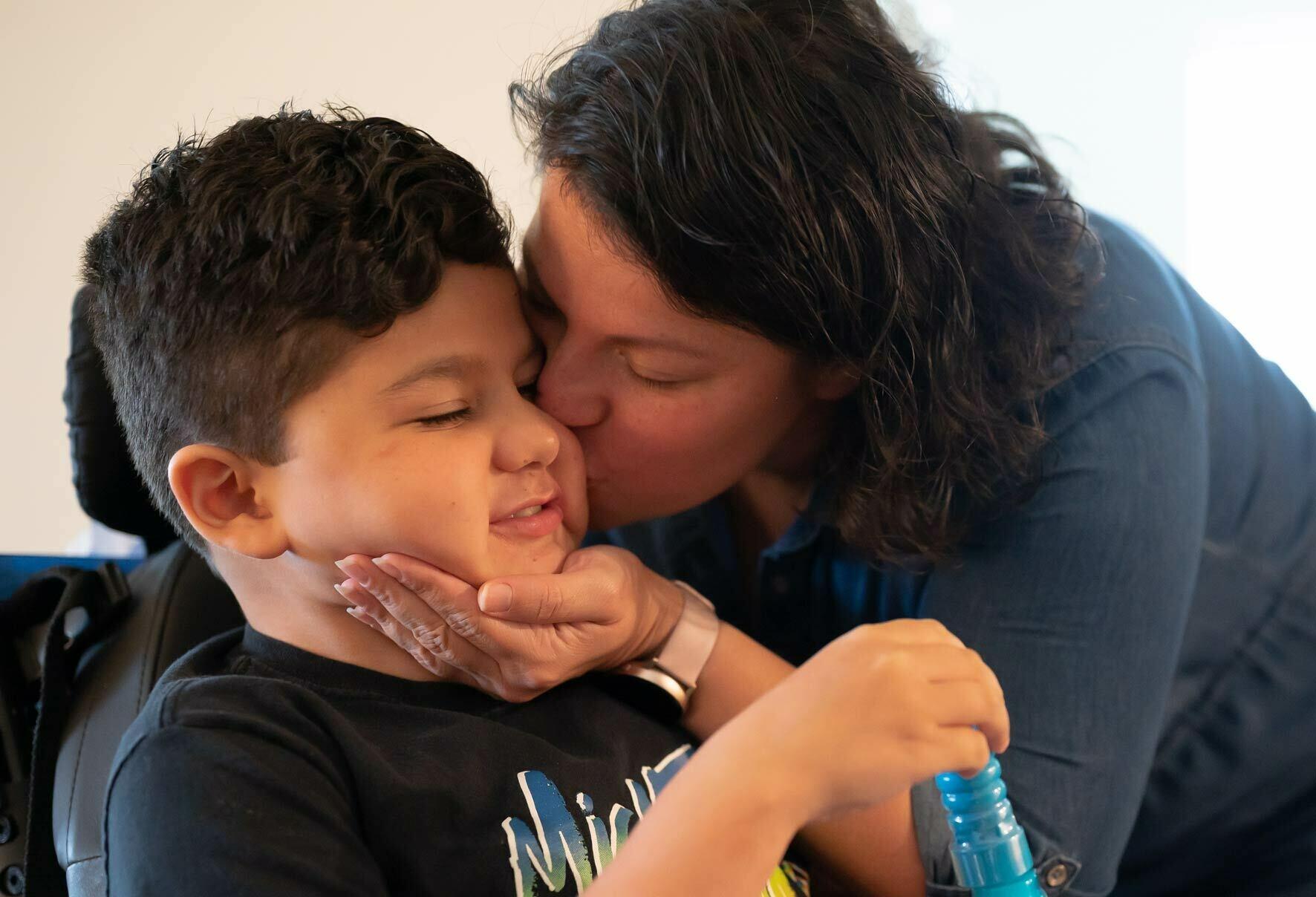
Reading Sam, working to understand his feelings and needs, requires extra attention. “We learned to read his body language and listen to his body,” says Esperanza. “When he started to crave seaweed. Why? He was low in vitamin K.” They have also adopted a selection of printed cards that Sam can point to—to tell them he’s hungry, in pain, or in need of using the bathroom. Caring for Sam is a full-time job. “We walk on eggshells every single day,” says Ramon. “If there is something going on, we have to stay one step ahead of it. We don’t want to call 911.”
One obstacle is Sam’s unusually high pain tolerance—a common tendency in kids on the spectrum. So, it was assumed it might be serious, when in 2018, Sam indicated that he was in pain. He went to the hospital and was found to have high liver enzymes. Sam was sent home, but soon began to develop petechiae, or dark brown spots all over his body. Esperanza called his doctor and rushed Sam back to the hospital.
Ramon was at work when he got the call from Esperanza. He asked to be relieved of his post for the afternoon and headed upstairs to see what the trouble was. “That’s when the doctor took me into a private room. He told me, ‘I’m sorry. Your son has cancer.’” Disbelief filled his mind. They must be wrong. Confused by the DMD. But Ramon knew, from years of experience in interventional radiology (IR), what was in store for his son. After PET scans and x-rays, a giant mass was revealed, going from shoulder to shoulder across Sam’s chest. He was diagnosed with T-cell acute lymphoblastic leukemia. Doctors wanted to start chemotherapy immediately.
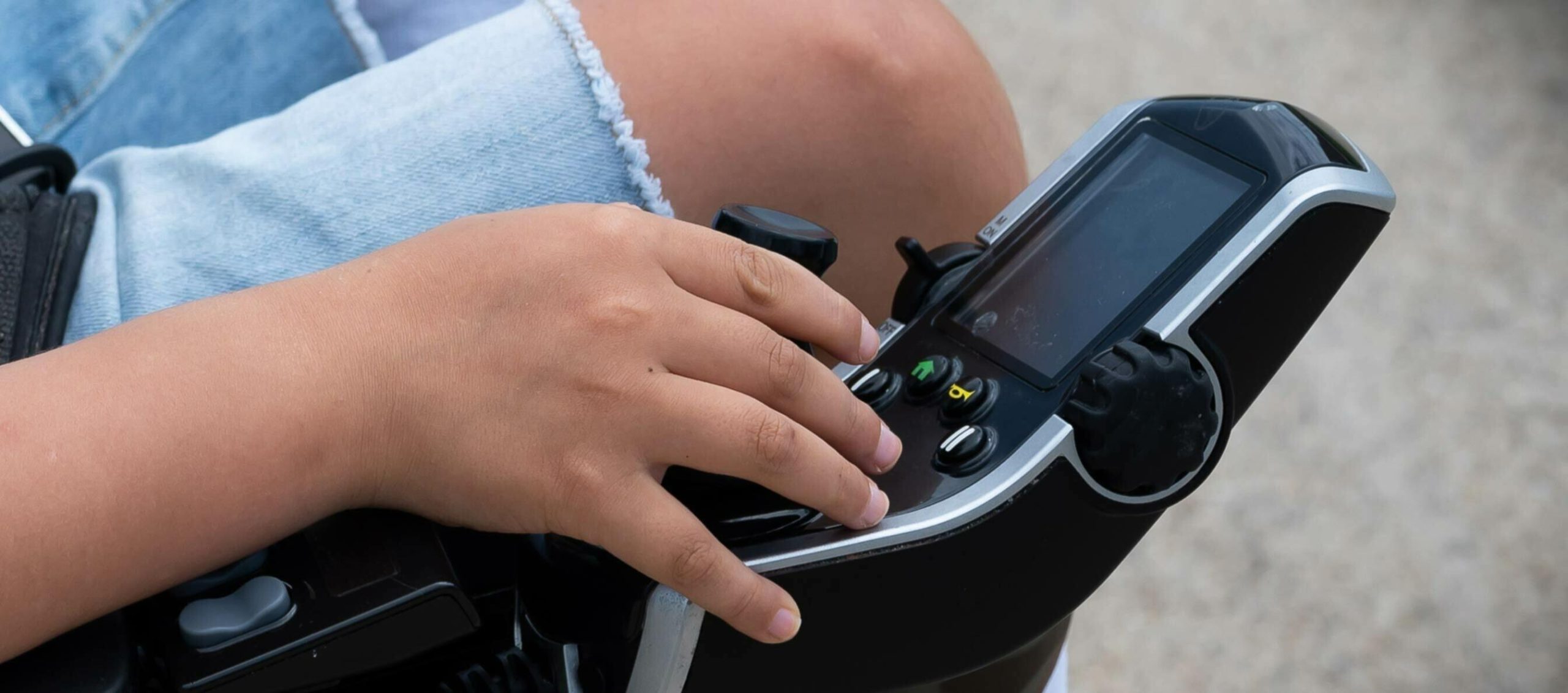
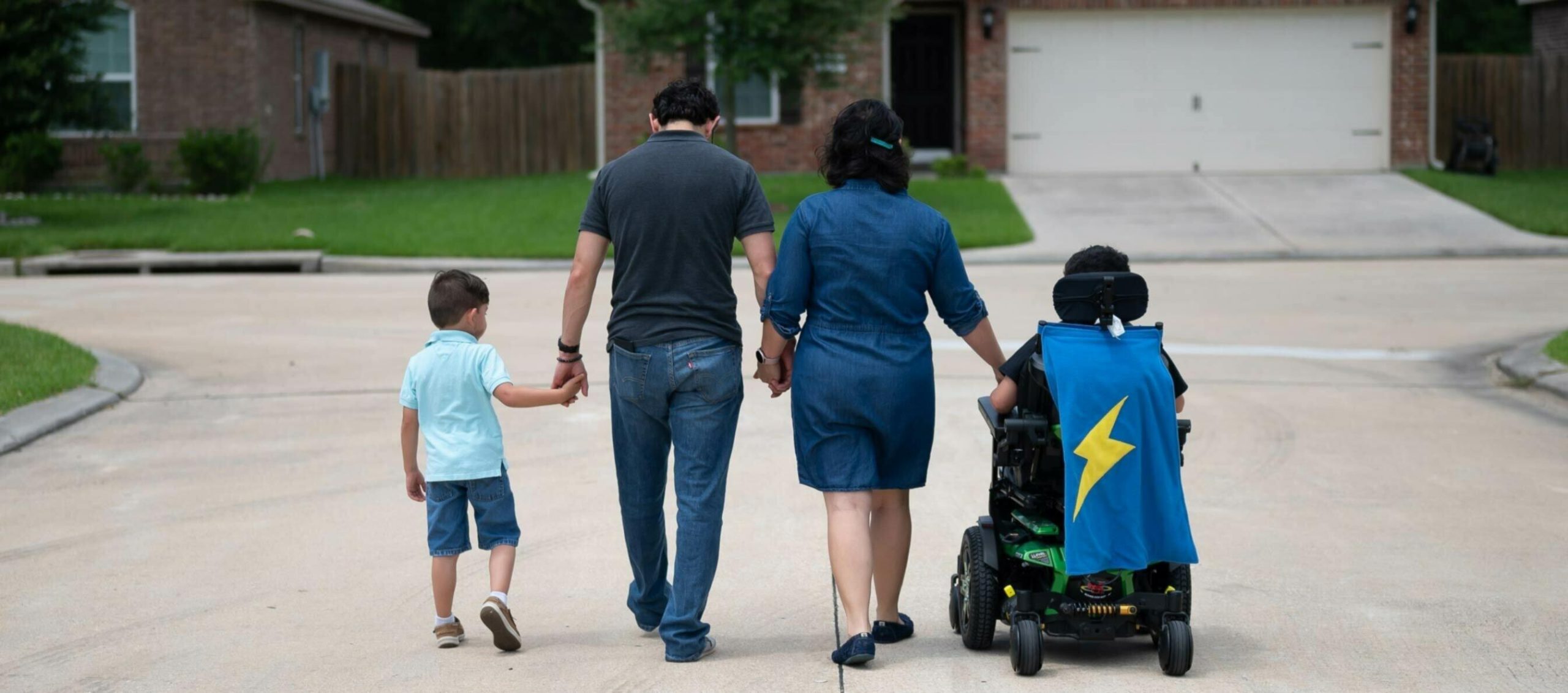
Ramon and Esperanza were hesitant and had no idea what going through chemo, while living with DMD, would mean for Sam. “We went in blindfolded,” says Esperanza. “They had never seen a case like him. They reached out to other doctors all over the country and world, and they couldn’t find another case.” With no precedent, they decided to move, knowing that the leukemia posed an immediate threat to Sam’s life.
Sam has spent the last three-and-a-half-years undergoing treatment for cancer. Chemotherapy was hard. After treatments Sam lost his hair, and could barely eat without getting sick. For the first year of chemo, Sam’s doctors treated the t-cell leukemia with standard doses. These exacerbated Sam’s DMD and he started getting weaker. His doses were adjusted down for maintenance, but he struggled with liver toxicity. Food became harder for him to tolerate.
This changed one day, the day Sam discovered supermarket sushi—now his favorite food. “He hadn’t been able to hold anything down,” recalls Esperanza. “But he stopped by the sushi rice balls and he ate them and felt totally fine.” Sam quickly developed a love for all things sushi, and it remains one of the simplest pleasures in life—along with visiting neighborhood grocery stores. “We’ll go around to different stores across Houston,” says Esperanza. “For Sam it’s like an adventure.”
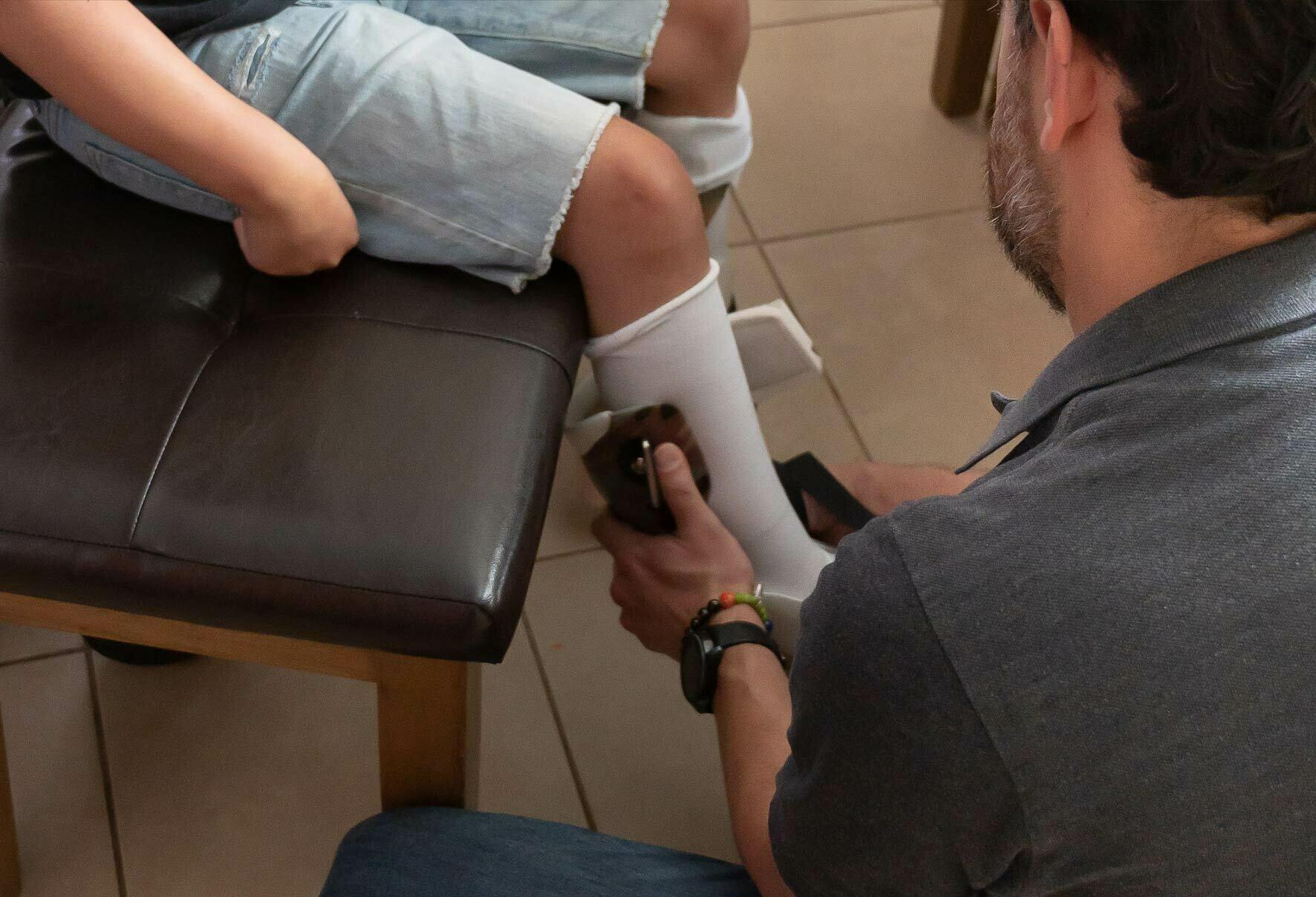
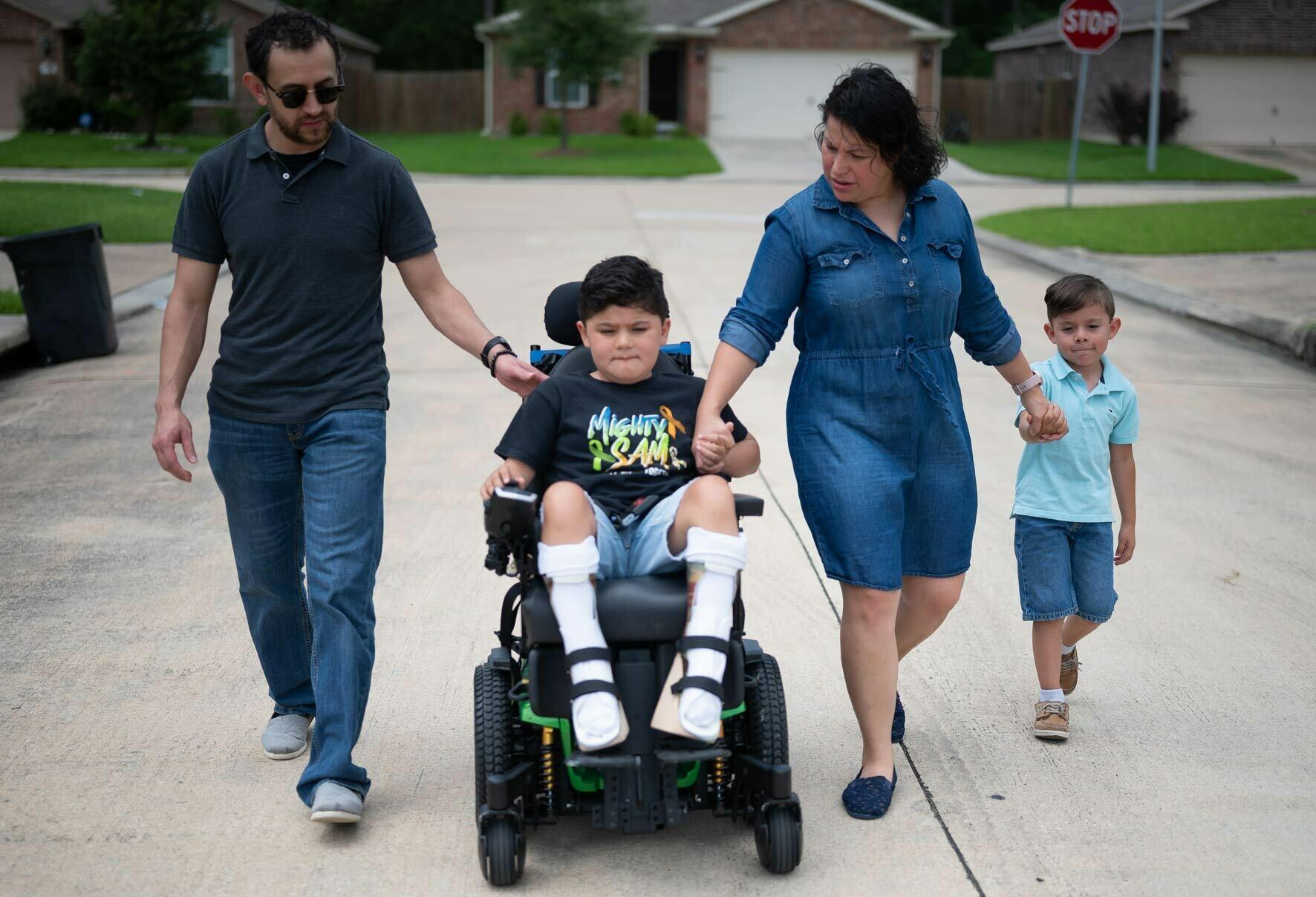
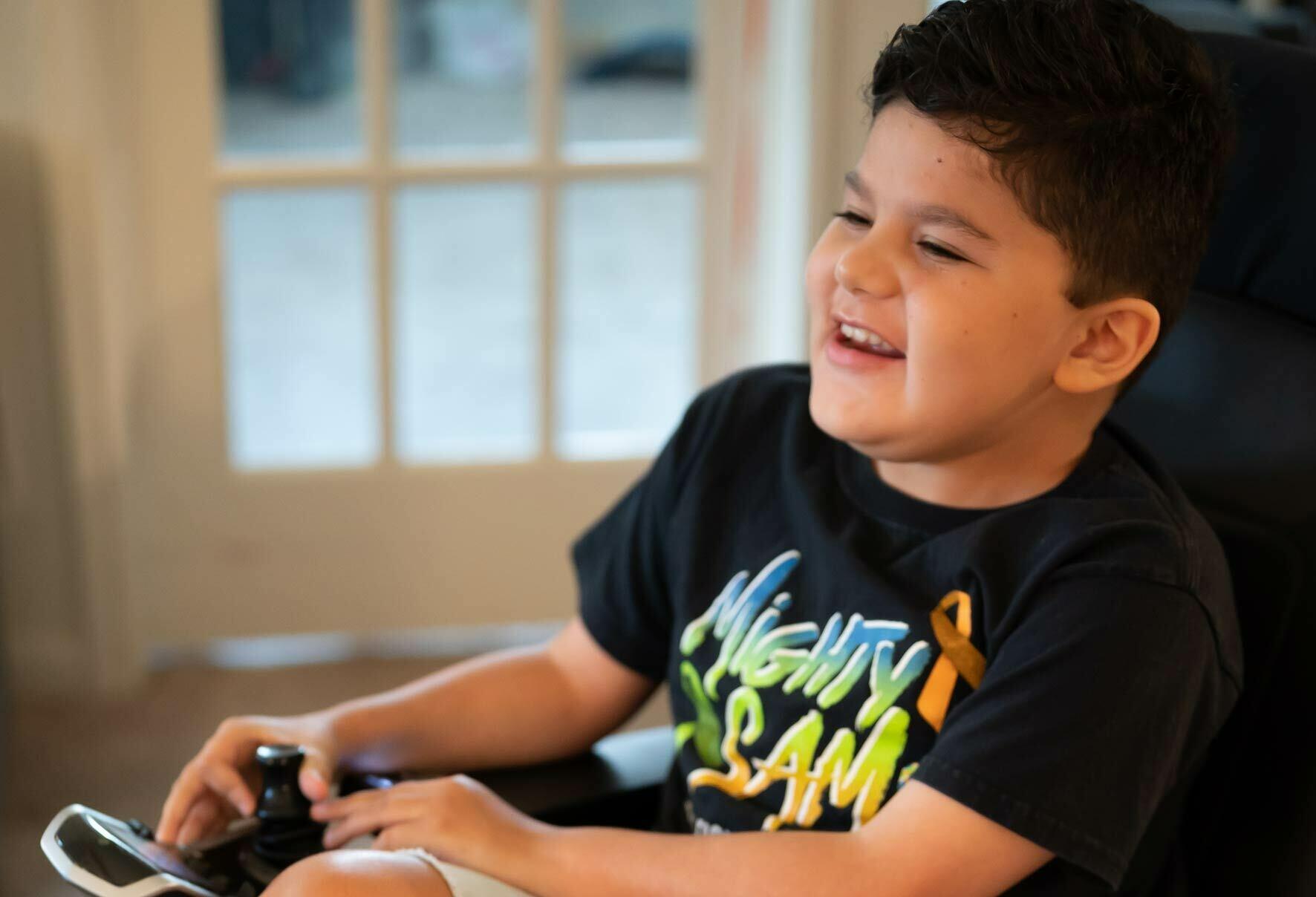
“It’s just a matter of time,” says Ramon. “Now that Sam is beating cancer, we need to keep him going strong.”
Fortunately, the high liver enzymes were not indicative of a relapse, and to everyone’s jubilation, Sam’s cancer treatments have been successful thus far at beating leukemia. “He is getting his last lumbar puncture next month,” says Esperanza. She plans a celebration at her church congregation when Sam finally finishes treatment—a day she prays for. “There will be a lot of bell ringing,” she pronounces.
With a reduction in chemotherapy, Sam’s appetite has also come back. It’s a Saturday evening, and Esperanza enters the living room to excitement, bags of food in each hand. She has gone to the family’s favorite local deli for sandwiches. Sam requests his favorite movie—watched dozens of times—The Polar Express. The worries of the past week slip away and peace fills the family’s house in the eastward expanses of the Houston metro area.
Mighty Sam continues to inspire his family and those who meet them. “It makes my day just to have Sam calm, and not in pain,” says Esperanza. She and Ramon look closely at developments across the drug development sphere, confident that a new, breakthrough treatment is not far away. “It’s just a matter of time,” says Ramon. “Now that Sam is beating cancer, we need to keep him going strong.” These developments, in conjunction with the family’s faith, and dedicated medical team are giving Sam a chance at overcoming the odds and living a longer life. Something this family prays for everyday.
